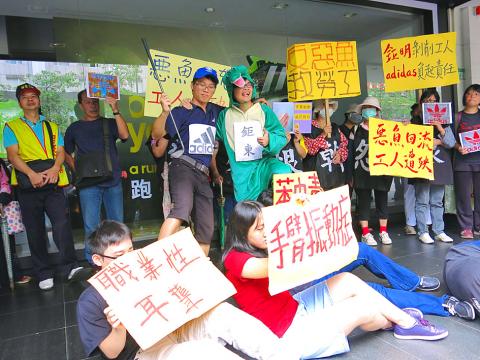Local labor groups urged sportswear giant Adidas yesterday to address poor working conditions at the factories of its Taiwanese suppliers in China, amid complaints of occupational diseases and health issues, such as benzene poisoning.
The activists pressed their calls in front of Adidas’ flagship store in Taipei in a protest that was part of a movement jointly launched by labor activists in Taiwan, China, Hong Kong and Indonesia, the protesters said.
Their primary target was Dynamic Precision Industry Corp (鉅明), a Taiwanese supplier that produced golf clubs for Adidas at its factory in Guangzhou, China, before recently shutting down its production line.

Photo: CNA
The activists accused the company of having maintained poor working conditions at the Guangzhou plant, which they said affected about 100 workers.
Some of them went deaf, while others have experienced benzene poisoning, or developed pneumoconiosis or hand-arm vibration syndrome, the activists said.
The Guangzhou plant’s management responded to the health complaints by laying off the workers and paying them severance, the activists alleged.
Those who refused to leave their jobs were pressured into doing so when the company cut their wages and eventually halted production, they said.
The protesters also expressed their opposition to Dynamic Precision Industry’s plan to move back to Taiwan, shouting the slogan: “Bad fish swims back, victimizing workers in Taiwan.”
Workers at another Taiwanese factory in China that makes goods for Adidas also came down with benzene poisoning, and one of them died in March, the activists said.
They called on Adidas to meet its social responsibilities by improving working conditions at its contract manufacturers and opening itself to supervision by labor groups.
They demanded that Adidas properly compensate the six workers from Dynamic Precision Industry with hand-arm vibration syndrome and see to it that workers suffering from benzene poisoning receive immediate treatment.
Lin Fan-shun (林凡舜), a public relations manager at Adidas, accepted a petition presented by the labor groups, but said he was not authorized to comment on the complaints because they involved manufacturers in China.
Lin also declined to respond positively to the activists’ request for a reply to their demands within five days.

CHIP WAR: Tariffs on Taiwanese chips would prompt companies to move their factories, but not necessarily to the US, unleashing a ‘global cross-sector tariff war’ US President Donald Trump would “shoot himself in the foot” if he follows through on his recent pledge to impose higher tariffs on Taiwanese and other foreign semiconductors entering the US, analysts said. Trump’s plans to raise tariffs on chips manufactured in Taiwan to as high as 100 percent would backfire, macroeconomist Henry Wu (吳嘉隆) said. He would “shoot himself in the foot,” Wu said on Saturday, as such economic measures would lead Taiwanese chip suppliers to pass on additional costs to their US clients and consumers, and ultimately cause another wave of inflation. Trump has claimed that Taiwan took up to

A start-up in Mexico is trying to help get a handle on one coastal city’s plastic waste problem by converting it into gasoline, diesel and other fuels. With less than 10 percent of the world’s plastics being recycled, Petgas’ idea is that rather than letting discarded plastic become waste, it can become productive again as fuel. Petgas developed a machine in the port city of Boca del Rio that uses pyrolysis, a thermodynamic process that heats plastics in the absence of oxygen, breaking it down to produce gasoline, diesel, kerosene, paraffin and coke. Petgas chief technology officer Carlos Parraguirre Diaz said that in

Japan intends to closely monitor the impact on its currency of US President Donald Trump’s new tariffs and is worried about the international fallout from the trade imposts, Japanese Minister of Finance Katsunobu Kato said. “We need to carefully see how the exchange rate and other factors will be affected and what form US monetary policy will take in the future,” Kato said yesterday in an interview with Fuji Television. Japan is very concerned about how the tariffs might impact the global economy, he added. Kato spoke as nations and firms brace for potential repercussions after Trump unleashed the first salvo of

SUPPORT: The government said it would help firms deal with supply disruptions, after Trump signed orders imposing tariffs of 25 percent on imports from Canada and Mexico The government pledged to help companies with operations in Mexico, such as iPhone assembler Hon Hai Precision Industry Co (鴻海精密), also known as Foxconn Technology Group (富士康科技集團), shift production lines and investment if needed to deal with higher US tariffs. The Ministry of Economic Affairs yesterday announced measures to help local firms cope with the US tariff increases on Canada, Mexico, China and other potential areas. The ministry said that it would establish an investment and trade service center in the US to help Taiwanese firms assess the investment environment in different US states, plan supply chain relocation strategies and